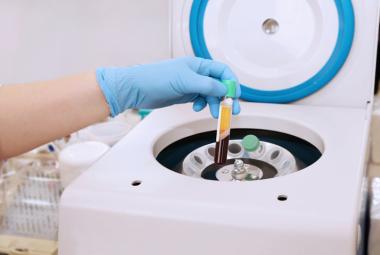Pregnant and lactating women are usually not included in clinical trials, leaving those who need medications or vaccines (and their providers) with little information with which to make informed decisions. Usually, we rely on the historic experiences of mothers who chose to breastfeed in these situations. The COVID-19 pandemic and vaccination effort is no different, highlighting the difficulty breastfeeding women face any time a new drug is approved without their inclusion in clinical trials.
The World Health Organization (WHO) recommends that infants be exclusively breastfed for the first 6 months of life, as breast milk provides all of an infant’s nutritional needs.1, 2 Furthermore, breast milk protects infants against infection through a variety of mechanisms, including the antibodies it contains.2, 3, 4
Immunoglobulins, or antibodies, are made by the immune system to protect against infection. Infants’ immune systems are immature.4, 5 Therefore, they rely on maternal antibodies prenatally through umbilical transfer and postnatally through breast milk. Antibodies from breast milk provide particular protection against infections of mucosal surfaces, such as the respiratory and gastrointestinal tracts. Immunoglobulin A (IgA) is the predominant antibody in breast milk and is the primary antibody that defends mucosal surfaces, while IgG is the most commonly produced antibody overall and is found throughout the whole body.4, 5 IgG protects against bacterial and viral infections long-term and can also be found in breast milk.
Vaccination is a form of active immunity whereby the body is prompted to make its own antibodies to fight infection upon future exposure. Inactivated vaccines are safe for pregnant and breastfeeding women alike, whereas live vaccines should be carefully considered during pregnancy due to risk of fetal infection. Maternal vaccination and subsequent breastfeeding can provide the benefits of vaccination to infants that are too young to receive the vaccine itself.6
The Pfizer and Moderna COVID-19 vaccines use mRNA technology. Cells use the mRNA as “instructions” to make certain proteins. mRNA vaccines work by instructing the body to make foreign proteins that the body’s immune system can then mount a response to. mRNA, natural or from a vaccine, does not enter the nucleus, so it can not change a person’s DNA.7, 8
In the case of COVID-19 mRNA vaccines, cells are instructed to make spike proteins, which are normally found on the virus’ surface. Spike proteins alone cannot cause disease. They can, however, teach the body to respond to COVID-19 by producing antibodies that target the virus spike. If you are then exposed to COVID-19, these antibodies bind to the spike proteins and stop the virus from infecting your cells. mRNA degrades quickly, so after the mRNA from a vaccine degrades, your body stops making spike proteins, and the only thing that remains is your immune system’s memory against the virus spike protein.
A cohort study among pregnant and lactating women who received the COVID-19 mRNA vaccines demonstrated that women who were pregnant or lactating produced a similar antibody response to non-pregnant and non-lactating women.9 All of the vaccinated women also produced more antibodies than pregnant women who had been infected with the virus, which suggests that vaccines may produce better immunity than having the infection. Antibodies to COVID-19 were also present in both the umbilical cord blood at birth and breast milk of women who received the vaccine. A study subsequently published by Prabhu et al. demonstrated that it takes about 16 days after vaccination for antibodies to appear in umbilical cord blood.10 The presence of antibodies in umbilical cord blood indicates that immunity likely temporarily transfers to the fetus of a vaccinated mother.
Findings from an unpublished study done on six lactating women demonstrated that maternal vaccination with either the Pfizer-BioNTech or Moderna vaccines resulted in the presence of COVID-19 antibodies in breast milk within one week of the first vaccine dose.11 These antibodies were shown to be specific against the COVID-19 spike protein. Interestingly, these women demonstrated an IgG dominant response in their breast milk, while in previous studies, women who had COVID-19 were shown to have an IgA dominant response in their breast milk. There was no difference in the level of antibody produced by each vaccine. The results of this study are promising because they provide further evidence that maternal COVID-19 vaccination is protective to breastfed infants.
A study among mothers who were infected with COVID-19 found that there were no detectable levels of COVID-19 virus in breast milk.12 There were, however, antibodies in the breast milk that were able to neutralize COVID-19. In some cases, viral RNA was found on the nipple areolar complex of the moms, but it was unclear if this RNA could infect the infant. It is best that if a breastfeeding mother has COVID-19 and has coughed on herself that she follow the WHO’s recommendations to wash her breast with warm soap and water before a breastfeeding session. It is plausible that a breastfeeding mother with COVID-19 would still have a low risk of transmitting the disease due to the neutralizing IgA antibodies in breastmilk.
The COVID-19 Johnson & Johnson’s Janssen vaccine works in a slightly different way. It uses a human adenovirus vector, or carrier, to deliver a piece of DNA that instructs the cell how to make the spike protein. The adenovirus vector is designed to prevent it from replicating.13, 14 A similar adenovirus causes the common cold, but in this situation it cannot make you sick or replicate in your body. Currently, there are no data published regarding safety of the Johnson & Johnson vaccine in pregnant or lactating women. This vaccine has caused rare reports of thrombosis-thrombocytopenia syndrome (TTS). TTS is a potentially life-threatening condition that was identified in 28 people within two weeks of vaccination with the Janssen vaccine, the majority of which were in young women. The overall incidence of TTS was 1.9 cases per million Janssen vaccinations and 7 cases per million women younger than 50. Simultaneously, the benefits of vaccinating this group with the Janssen vaccine are estimated at preventing 6 COVID-19 deaths, 56 ICU admissions, and 297 hospital admissions per million vaccinated women ages 18-49.15 Although TTS is a serious condition, the benefit of vaccination against the risk of a COVID-19 diagnosis may still overcome the rare risk of TTS.
Current evidence suggests that it is safe to receive the Pfizer-BioNTech or Moderna mRNA vaccines while breastfeeding, and that immunity to the infant may be conferred. We currently have less information on adenovirus COVID-19 vaccines in pregnant and lactating women, but the benefits may still outweight the risks when mRNA vaccines are not available. This is consistent with the American College of Obstetricians and Gynecologists (ACOG) which recommends vaccination of lactating women.16
For more information on current recommendations, check out: https://www.infantrisk.com/covid-19-vaccine-pregnancy-and-breastfeeding
Layan Al-Sukhni, MS3
Christine D Garner, PhD, RD, CLC
Kaytlin Krutsch, PharmD, MBA, BCPS
References
- World Health Organization. Breastfeeding. https://www.who.int/health-topics/breastfeeding#tab=tab_1. Published 2021. Accessed April 7, 2021.
- Centers for Disease Control and Prevention. Breastfeeding: why it matters. https://www.cdc.gov/breastfeeding/about-breastfeeding/why-it-matters.html. Published 2021. Accessed April 1, 2021.
- Andreas NJ, Kampmann B, Mehring Le-Doare K. Human breast milk: A review on its composition and bioactivity. Early Hum Dev. Nov 2015;91(11):629-35. doi:10.1016/j.earlhumdev.2015.08.013
- Welsh JK, May JT. Anti-infective properties of breast milk. J Pediatr. Jan 1979;94(1):1-9. doi:10.1016/s0022-3476(79)80340-6
- Van de Perre P. Transfer of antibody via mother's milk. Vaccine. Jul 28 2003;21(24):3374-6. doi:10.1016/s0264-410x(03)00336-0
- Munoz FM, Jamieson DJ. Maternal Immunization. Obstet Gynecol. Apr 2019;133(4):739-753. doi:10.1097/AOG.0000000000003161
- Pardi N, Hogan MJ, Porter FW, Weissman D. mRNA vaccines - a new era in vaccinology. Nat Rev Drug Discov. Apr 2018;17(4):261-279. doi:10.1038/nrd.2017.243
- Centers for Disease Control and Prevention. Understanding mRNA COVID-19 Vaccines. https://www.cdc.gov/coronavirus/2019-ncov/vaccines/different-vaccines/mrna.html. Published 2021. Accessed April 1, 2021.
- Gray KJ, Bordt EA, Atyeo C, et al. Coronavirus disease 2019 vaccine response in pregnant and lactating women: a cohort study. Am J Obstet Gynecol. Mar 26 2021;doi:10.1016/j.ajog.2021.03.023
- Prabhu M, Murphy E, Sukhu A et al. Antibody Response to Coronavirus Disease 2019 (COVID-19) Messenger RNA Vaccination in Pregnant Women and Transplacental Passage Into Cord Blood. Obstetrics & Gynecology. 2021;Publish Ahead of Print. doi:10.1097/aog.0000000000004438
- Baird J, Jensen S, Urba W, Fox B, Baird J. SARS-CoV-2 antibodies detected in human breast milk post-vaccination. 2021. doi:10.1101/2021.02.23.21252328
- Pace RM, Williams JE, Jarvinen KM, et al. Characterization of SARS-CoV-2 RNA, Antibodies, and Neutralizing Capacity in Milk Produced by Women with COVID-19. mBio. Feb 9 2021;12(1)doi:10.1128/mBio.03192-20
- World Health Organization. Background document on the Janssen Ad26.COV2.S (COVID-19) vaccine: Background document to the WHO Interim recommendations for use of Ad26.COV2.S (COVID-19) vaccine. https://www.who.int/publications/i/item/WHO-2019-nCoV-vaccines-SAGE-recommendation-Ad26.COV2.S-background-2021.1. Published 2021. Accessed June 6, 2021.
- Zhu FC, Guan XH, Li YH, et al. Immunogenicity and safety of a recombinant adenovirus type-5-vectored COVID-19 vaccine in healthy adults aged 18 years or older: a randomised, double-blind, placebo-controlled, phase 2 trial. Lancet. Aug 15 2020;396(10249):479-488. doi:10.1016/S0140-6736(20)31605-6
- MacNeil JR, Su JR, Broder KR, et al. Updated Recommendations from the Advisory Committee on Immunization Practices for Use of the Janssen (Johnson & Johnson) COVID-19 Vaccine After Reports of Thrombosis with Thrombocytopenia Syndrome Among Vaccine Recipients - United States, April 2021. MMWR Morb Mortal Wkly Rep. Apr 30 2021;70(17):651-656. doi:10.15585/mmwr.mm7017e4
- American College of Obstetrics and Gynecologists. COVID-19 Vaccination Considerations for Obstetric–Gynecologic Care. https://www.acog.org/clinical/clinical-guidance/practice-advisory/articles/2020/12/vaccinating-pregnant-and-lactating-patients-against-covid-19. Published 2021. Accessed April 1, 2021.







